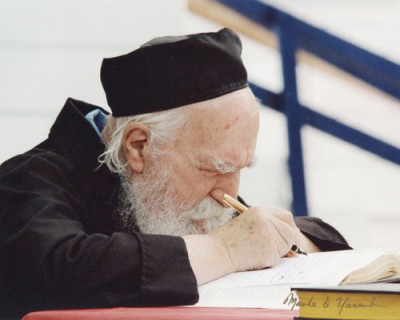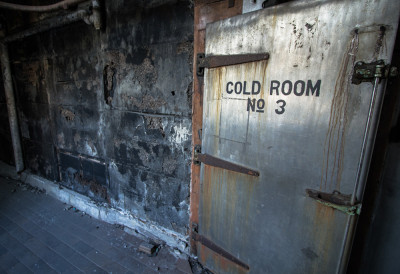

In this week's parshah (25:8), Hashem instructed the Jewish people to build a Mishkan (Tabernacle). The pasuk says "V'asu li mikdash v'shachanti b'socham," And they shall make me a Mishkan and I shall dwell in them. The wording in this pasuk seems incorrect. Seemingly, Hashem should have said that He "will dwell in it," meaning that the Shechinah will dwell in the Mishkan itself. Why does Hashem mean by instead saying, "And I will dwell in them?"
My father, Rav Yitzchok Fingerer shlit"a, relates a beautiful response. Rav Menachem Mendel of Kotzk answered this question explaining that the Shechinah is not limited to a physical space where the Mishkan rests. Rather, every Jew has the ability to be a living and breathing, walking and talking Mishkan where the Shechinah is welcome to reside! When Hashem states, "I will dwell in them," the Almighty is revealing that He will rest within every person who allows the Shechinah into their lives! What an incredible opportunity!
One morning, a young man living in Eretz Yisrael had an important question for Rav Moshe Feinstein in New York. When Rav Moshe answered, the caller immediately realized that the gadol had just woken up. Suddenly, he remembered the seven hour time difference, and noticed that it was 2 a.m. in Manhattan! Embarrassed, the caller quickly apologized, expressing that he was calling from Eretz Yisrael and forgot the time zones and prepared to disconnect the line. Rav Moshe replied, "Please don't hang up yet. Give me a few minutes, I will be right back." The man understood that Rav Moshe probably needed to wash his hands and recite birchat haTorah said each morning.
Rav Moshe soon returned, apologized for the delay, and inquired how he could assist. The man asked his question, and Rav Moshe gave an answer. Afterward, hearing the query and giving advice, Rav Moshe asked the man for his address. Bewildered by the request, the man consented.
A few weeks later an envelope with a note and a check from the hand of Rav Moshe arrived at this man's home. Rav Moshe wrote, "I know that I kept you waiting for a few minutes on a long-distance call. The check is to cover the extra charge that you incurred." The man was shocked. Not only did Rav Moshe not get upset for disturbing his sleep, but felt that the time taken to prepare to hear out the caller required reimbursement! Only someone who allows the Shechinah into their lives can act in such fashion. We all can strive to be a living and breathing, walking and talking Mishkan where the Shechinah can reside!
Parshat Tetzaveh: From Death to Life
Parshat Tetzaveh (28:4) discusses the ornaments and vestments that were worn by Aharon, the Kohen Gadol, in his service to Hashem, including the choshen, breastplate, worn on his heart. Inscribed on it were the names of the twelve tribes representing the Jewish people, symbolizing that a leader holds his People near and close to his heart. On the eifod, another item worn by the Kohen Gadol, were shoulder straps. Emblazoned and inscribed on them were again the shevatim. It is asked, was it not enough for Aharon HaKohen to have the Jewish People on his heart; why also on his shoulders?
My father, Rav Yitzchok Fingerer shlit"a, in the name of the Be'er Mayim Chaim shares that no, it is not sufficient to hold someone close to your heart. Sometimes, you must raise the individual. Some folks are drowning either physically or spiritually and need to be saved. Firefighters, soldiers, and lifeguards save someone by lifting them on their shoulders; raising them high up. A person is rescued by being elevated and changed for the better.
One night in South America at a massive operation in a slaughterhouse the boss questioned the security guard why he had yet to lock up the facilities. The patrolman replied that some workers were still lingering inside. The boss fired, “What do you mean? The plant is a ghost town; I walked through the entire complex and no one is here. It's empty!" The security guard persisted, "The Rabbi, the mashgiach (head of kosher supervision) is still in there." The guard continued, "This rabbi has worked here for 23 years and without fail when he leaves for the night he always says, '¡Buenas noches!' Have a good evening. He always takes an interest in me and smiles as he leaves. Tonight, the rabbi did not wish a good night, so he must still be inside!” The boss responded, “Listen, I checked and it is vacant. Lock up the place!" The guard refused and left to search for the missing mashgiach. From room to room the guard checked until heading down to the freezers where he heard moaning and groaning. Rushing to open the freezer door, he found the rabbi deep into hypothermia, frozen and nearing his final breath. The guard called medical personnel who thankfully resuscitated and revived the rabbi that had gotten locked in the freezer. The rabbi’s life was saved and Baruch Hashem was able to return to his beautiful family.
The mashgiach's life was saved because he treated the security guard as someone important; someone that he elevated! The rabbi cared about the guard having him not only on his heart but also on his shoulders; treating him as someone that is special and unique. We too must try to emulate the mashgiach. Instead of holding someone close to your heart, sometimes you must put them on your shoulders and raise them up. You may have the opportunity to save them!
Jewish n’ Joyful podcast and its videos are available on all main streaming platforms. Subscribe, sponsor a week of Parsha Knowledge, or send feedback on our newsletter that is packed with Torah thoughts, stories, and inspiration on the weekly parshah at This email address is being protected from spambots. You need JavaScript enabled to view it., or visit www.parshaknowledge.com.
Parshat Terumah: The Late Phone Call
Typography
- Smaller Small Medium Big Bigger
- Default Helvetica Segoe Georgia Times
- Reading Mode



